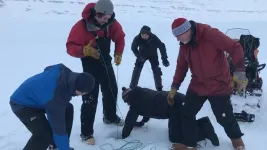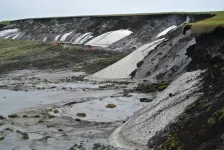(Press-News.org) Crucial shift in River Nile’s evolution during ancient Egypt discovered
Researchers have explored how the River Nile evolved over the past 11,500 years and how changes in its geography could have helped shape the fortunes of ancient Egyptian civilisation.
Research published in Nature Geoscience reveals a major shift in the Nile around four thousand years ago, after which the floodplain in the Nile Valley around Luxor greatly expanded.
The findings raise the possibility that this shift could have contributed to the success of the ancient Egyptian agricultural economy at points between the Old and New Kingdom periods. The New Kingdom was a period of unparalleled prosperity, military conquest, and cultural achievement in Ancient Egyptian history.
Dr Benjamin Pennington, a co-author on the paper from the University of Southampton said: “The expansion of the floodplain will have greatly enlarged the area of arable land in the Nile Valley near Luxor (ancient Thebes) and improved the fertility of the soil by regularly depositing fertile silts.”
“While no specific causal links can be inferred between this shift and any contemporaneous social developments, the changes in the landscape are nonetheless an important factor that need to be considered when discussing the trajectory of Ancient Egyptian culture.”
The study also suggests that changes in the Nile's behaviour and landscape might have influenced settlement patterns and the location of iconic historical structures, such as Karnak temple.
The research was carried out by an international team led by Dr Angus Graham of Uppsala University in Sweden and including several archaeologists and geographers from the University of Southampton.
Dominic Barker, another co-author also from the University of Southampton, explained how the work was achieved: “We drilled 81 boreholes, many by hand, across the whole Nile Valley near Luxor – a genuine first for Egypt. Using geological information contained within the cores, and dating the sediments using a technique called Optically Stimulated Luminescence we were able to piece together the evolution of the riverine landscape.”
The team found that between around 11,500 and four thousand years ago, the Nile experienced significant valley incision, meaning the river cut down into its bed, creating deep channels and a narrower flood plain. This may have led to more pronounced and forceful flooding.
These flood dynamics would have been in place between the Epipalaeolithic period (a time of hunter-gatherer societies) and the Old Kingdom (the ‘age of the pyramids’) and perhaps the Middle Kingdom of ancient Egypt.
“The Egyptian Nile we see today looks very different from how it would have been throughout much of the last 11,500 years,” says Dr Pennington. “For most of this time, the Nile was made up of a network of interwoven channels that frequently changed their course.”
Around 4,000 years ago, the Nile abruptly shifted and there was rapid floodplain aggradation, where the river began depositing large amounts of sediment, building up the valley floor. This created a more expansive and stable floodplain.
The river also progressively changed character during this time – from a dynamic wandering-braided system to fewer, more stable channels. The single-channel Nile we are familiar with today didn’t really establish itself until around two thousand years ago.
The researchers say the major shift in the Nile’s behaviour was likely caused by a reduction in the volume of water flowing through the river and an increase in fine sediment supply. This was driven by the aridification of the Nile basin, with the ‘Green Sahara’ of the African Humid Period transforming into the present-day hyper-arid Sahara Desert. This shift in regional climate may have further combined with changing human impacts on the land to make the soil more prone to erosion.
The new insights into the evolution of the Egyptian Nile Valley near Luxor provide essential landscape context for archaeologists and Egyptologists to reinterpret ancient sites in the region and re-consider locations of settlements in the Nile Valley.
The paper Shift away from Nile incision at Luxor ~4,000 years ago impacted ancient Egyptian landscapes is available online.
The research was funded by the Knut and Alice Wallenberg Foundation and Uppsala University.
Ends
Contact
Steve Williams, Media Manager, University of Southampton, press@soton.ac.uk or 023 8059 3212.
Notes for editors
The paper Shift away from Nile incision at Luxor ~4,000 years ago impacted ancient Egyptian landscapes is available here: https://www.nature.com/articles/s41561-024-01451-z
For Interviews with Dr Benjamin Pennington please contact Steve Williams, Media Manager, University of Southampton press@soton.ac.uk or 023 8059 3212.
Images: https://safesend.soton.ac.uk/pickup?claimID=AKYuHBsoJmWayjZ6&claimPasscode=cpWgNrx3CNzh7iFi
Photo 1. Hand-auger team in action in a Berseem field on the Nile’s West Bank. Credit: Angus Graham
Photo 2. Percussion-corer team drilling for geological samples in a sugarcane field in front of the Theban Hills. Credit: Angus Graham
Additional information
The University of Southampton drives original thinking, turns knowledge into action and impact, and creates solutions to the world’s challenges. We are among the top 100 institutions globally (QS World University Rankings 2023). Our academics are leaders in their fields, forging links with high-profile international businesses and organisations, and inspiring a 22,000-strong community of exceptional students, from over 135 countries worldwide. Through our high-quality education, the University helps students on a journey of discovery to realise their potential and join our global network of over 200,000 alumni. www.southampton.ac.uk
www.southampton.ac.uk/news/contact-press-team.page
Follow us on X: https://twitter.com/UoSMedia
END
Crucial shift in River Nile’s evolution during ancient Egypt discovered
2024-06-03
ELSE PRESS RELEASES FROM THIS DATE:
Study shows college students have less empathy when they are less alert
2024-06-03
DARIEN, IL – A new study to be presented at the SLEEP 2024 annual meeting found robust evidence that implicates lower alertness, a key outcome of insufficient sleep, as a predictor of muted empathic responding, which suggests alertness may support both cognitive and affective empathy.
Results show that slower response times on objective alertness tests were significantly associated with lower levels of empathic concern, and that lapses and false starts on these tests were significantly associated with poorer empathic accuracy. Additionally, those ...
Study finds that older adults with sleep apnea have higher odds of hospitalization
2024-06-03
DARIEN, IL – A new study to be presented at the SLEEP 2024 annual meeting found that sleep apnea is associated with increased odds of future utilization of health care services including hospitalization among older adults.
Results show that participants aged 50 years and older with sleep apnea had a 21% higher odds of reporting future use of any health service compared with those without sleep apnea. Specifically, individuals with sleep apnea had 21% higher odds of hospitalization after controlling for potential confounders including demographics, body mass index, health conditions, and depressive symptoms.
“Our research indicates that older adults who have sleep apnea are more ...
Most sleep tips shared on TikTok are supported by scientific evidence
2024-06-03
DARIEN, IL – A new study to be presented at the SLEEP 2024 annual meeting found that most sleep tips shared on TikTok are supported by empirical evidence.
The research findings show that of 35 unique sleep tips shared in popular videos, there was empirical support for 29. Only six sleep tips were unsupported by scientific evidence.
“These results suggest that the sleep research and sleep medicine communities have done a good job of promoting appropriate tips for sleep hygiene,” said lead author Brian T. Gillis, who has studied sleep for eight years and is an assistant professor of marriage and family therapy in the College of Human Sciences ...
Low-dose aspirin reduces inflammation caused by sleep loss
2024-06-03
DARIEN, IL – A new study to be presented at the SLEEP 2024 annual meeting found that low-dose acetylsalicylic acid, also known as aspirin, can reduce inflammatory responses to sleep restriction.
Results show that compared with placebo, preemptive administration of low-dose aspirin during sleep restriction reduced pro-inflammatory responses. Specifically, aspirin reduced interleukin-6 expression and COX-1/COX-2 double positive cells in lipopolysaccharide-stimulated monocytes, as well as C-reactive protein serum levels.
“The novelty of this study is that it investigated whether we can pharmacologically reduce the inflammatory consequences of sleep restriction,” ...
Scientists develop “x-ray vision” technique to see inside crystals
2024-06-03
A team of New York University researchers has created a new way to visualize crystals by peering inside their structures, akin to having X-ray vision. Their new technique—which they aptly named “Crystal Clear”—combines the use of transparent particles and microscopes with lasers that allow scientists to see each unit that makes up the crystal and to create dynamic three-dimensional models.
“This is a powerful platform for studying crystals,” says Stefano Sacanna, professor of chemistry at NYU and the principal investigator for the study, published in the journal Nature ...
Arctic melting heavily influenced by little-studied meteorological phenomena, find scientists led by UMass Amherst
2024-06-03
AMHERST, Mass. – A team of scientists led by François Lapointe, a research associate at the University of Massachusetts Amherst, has combined paleoclimatic data from the last 2,000 years with powerful computer modeling and in-the-field research on lake sediments and tree rings to show that an understudied phenomenon, known as atmospheric blocking, has long influenced temperature swings in the Arctic. As temperatures warm due to climate change, atmospheric blocking will help drive ever-wilder weather events. The study focused ...
Where do Nextdoor communities exist—and what do these communities talk about?
2024-06-03
Nextdoor is the world’s largest hyperlocal social media network, used by 13% of American adults. Yet little is known about the make-up of the actual neighborhoods—numbering approximately 220,000 across the United States—in which these accounts exist and what people in those communities talk about on the platform.
To address our limited understanding of this population, a team of New York University and University of Michigan researchers generated a demographic portrait of communities in which Nextdoor neighborhoods exist, the presence of public agencies in those communities, and what topics are most often discussed. Using U.S. Census data, other publicly available ...
Thawing permafrost: Not a climate tipping element, but nevertheless far-reaching impacts
2024-06-03
Permafrost soils store large quantities of organic carbon and are often portrayed as a critical tipping element in the Earth system, which, once global warming has reached a certain level, suddenly and globally collapses. Yet this image of a ticking timebomb, one that remains relatively quiet until, at a certain level of warming, it goes off, is a controversial one among the research community. Based on the scientific data currently available, the image is deceptive, as an international team led by the Alfred Wegener Institute has shown in a recently released study. According to their findings, there is no single ...
To eliminate COVID-era bloodstream infections in heart, lung patients, Tampa Hospital had to innovate
2024-06-03
San Antonio, Texas – June 3, 2024 – Recognizing an unusual prevalence of bloodstream infections (BSI) that threatened extremely ill patients receiving Extracorporeal Membrane Oxygenation, or ECMO, Tampa General Hospital (TGH) infection preventionists started an intervention that eliminated these infections completely from their 18-bed Cardiothoracic Intensive Care Unit (CTICU).
At the APIC 2024 Annual Conference, presenters from the 1,000-bed, tertiary care, academic medical system reported on how they reduced bloodstream infections in ECMO patients from a rate of 36% in October 2021 to a rate of 0% in April 2022. This rate was sustained for seven ...
New pathways for treating never-smoker lung cancer revealed
2024-06-03
The primary cause of lung cancer is smoking. However, the incidence of lung cancer among never-smokers has been steadily increasing, especially among women. While approximately 80% of never-smoking lung cancer patients are prescribed targeted therapies that focus on mutations in proteins such as EGFR and ALK, the remaining patients often receive cytotoxic chemotherapy with high side effects and relatively low response rates, highlighting the urgent need for targeted therapies.
Dr. Lee Cheolju's ...



